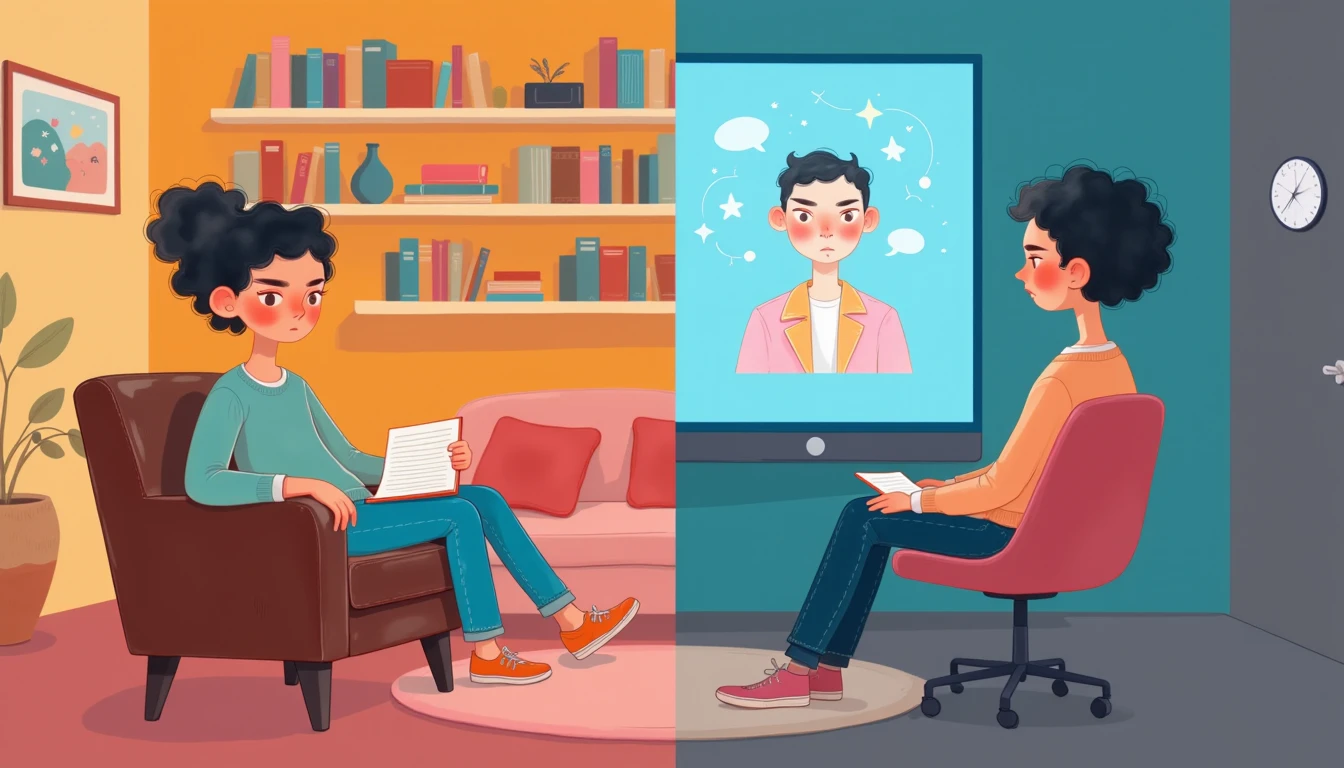The Rise of AI Therapists in Modern Society
As we journey further into the 21st century, technology continues to intertwine with every aspect of our lives, transforming how we communicate, work, and even manage our health. One of the most intriguing developments in recent years is the rise of AI therapists—digital companions designed to assist with mental health. These AI-powered platforms are reshaping the landscape of mental health care, offering new dimensions to therapy and support.
But how exactly are AI therapists influencing modern society, and what potential do they hold alongside human practitioners? In this article, we'll delve into their growing presence and explore the implications for the future of mental health care.
The Emergence of AI Therapists
A New Frontier in Mental Health Support
AI therapists represent a significant advancement in the application of artificial intelligence within the healthcare sector. They utilize AI technologies to provide mental health support through conversations with users, simulating human-like interactions to offer guidance, suggest coping strategies, and provide a listening ear.
The development of AI therapists stems from a growing need for accessible mental health resources. With increasing awareness of mental health issues and a shortage of professionals in many regions, AI offers a promising avenue to bridge the gap.
How Do AI Therapists Work?
At the core of AI therapists is the ability to understand and generate human language, enabling them to engage in meaningful conversations. They employ a combination of advanced technologies to achieve this:
-
Natural Language Processing (NLP): This technology allows AI therapists to comprehend and interpret human language, making interactions feel more natural and fluid.
-
Machine Learning Algorithms: These algorithms enable AI therapists to learn from each interaction, improving their responses over time and tailoring support to individual users.
-
Sentiment Analysis: By assessing the emotional tone of the user's input, AI therapists can adjust their responses to be more empathetic and appropriate to the user's current state.
For instance, if a user expresses feelings of sadness or anxiety, the AI therapist can recognize these emotions and offer comforting words or suggest coping mechanisms.

AI therapists provide accessible mental health support through user-friendly platforms.
The Advantages of AI Therapists
One of the most significant benefits of AI therapists is their accessibility. They are available 24/7, providing immediate support without the need for appointments. This constant availability means individuals can seek help whenever they need it, whether during a late-night anxiety episode or a stressful moment during the day.
Additionally, AI therapists have a global reach. As long as there is an internet connection, users from any location can access these services. This feature is particularly beneficial in remote or underserved areas where mental health resources are scarce.
Affordability is another advantage. Traditional therapy can be expensive, and not everyone has insurance coverage or the financial means to afford regular sessions. AI therapists often provide a more cost-effective alternative, lowering financial barriers to mental health care. Some platforms offer free basic services, while others have subscription models that are generally more affordable than traditional therapy fees.
For many individuals, the stigma associated with seeking mental health support can be a significant deterrent. AI therapists offer a level of anonymity that can make users feel more comfortable sharing personal thoughts and feelings. Knowing they are interacting with an AI rather than a human can alleviate fears of judgment or embarrassment, encouraging more open and honest communication.
Moreover, AI therapists provide consistent responses, unaffected by mood or subjective opinions. This consistency can be reassuring for users, knowing they will receive the same level of support each time they engage. AI therapists can also utilize data-driven insights to track user progress over time. By analyzing patterns in behavior and responses, they can offer personalized feedback and adapt their support to better meet the user's needs.
AI therapists can serve as a valuable supplement to traditional therapy. They provide support between sessions, help reinforce coping strategies, and offer immediate assistance when a human therapist is unavailable. This combination can enhance the overall effectiveness of mental health care.
Real-World Applications and Examples
Several AI therapy platforms have gained prominence, demonstrating the practical applications of this technology. For instance:
-
MindLumen AI offers personalized support, exercises, and educational programs to help users improve their mental health.
-
Woebot is an AI chatbot that employs cognitive-behavioral therapy techniques to help users manage mental health challenges such as depression and anxiety.
-
Wysa acts as an AI coach, providing empathetic conversations and tools for coping with stress, sleep issues, and relationship problems.
These platforms illustrate how AI therapists can be integrated into daily life, offering accessible support to a broad audience. Designed to be user-friendly and often available via smartphone apps, they make mental health resources more approachable than ever before.
The Limitations and Challenges of AI Therapists
While AI therapists present exciting opportunities, they also come with limitations and challenges that must be addressed.
Lack of Human Empathy and Emotional Intelligence
One primary concern is that AI cannot fully replicate the depth of human empathy. Human therapists bring emotional intelligence, intuition, and the ability to interpret non-verbal cues—all crucial in understanding and supporting clients. AI therapists may miss subtle emotional nuances or fail to recognize when a user is in crisis, potentially leading to inadequate support.
For complex mental health issues, such as severe depression, trauma, or psychosis, professional human intervention is essential. AI therapists are not equipped to handle these situations and should not replace qualified mental health professionals.
Ethical and Privacy Concerns
The use of AI in mental health raises significant ethical considerations, particularly regarding privacy and data security. Users share highly sensitive information during therapy sessions, and it's imperative that this data is protected.
Concerns include:
-
Data Security: Ensuring personal and emotional data are stored securely and not vulnerable to breaches.
-
Informed Consent: Users must be fully aware of how their data will be used and have the option to opt out of data collection practices they are uncomfortable with.
-
Transparency: Companies must be transparent about their data handling policies and the limitations of their AI systems.

The future of mental health care may involve a collaborative approach between AI and human therapists.
Dependence and Over-Reliance
There's a risk that individuals may become overly reliant on AI therapists, using them as a substitute for professional help when it's truly needed. This dependence could delay critical interventions and exacerbate mental health conditions.
It's important for AI therapy platforms to set clear guidelines, encouraging users to seek professional assistance when necessary and recognizing the boundaries of their services.
Regulatory and Quality Assurance
The rapid development of AI therapists has outpaced the establishment of universal standards and regulations. Without standardized guidelines, there's variability in the quality and efficacy of different platforms.
Issues to consider include:
-
Accuracy and Reliability: Ensuring the AI provides appropriate and helpful responses.
-
Accountability: Determining who is responsible in cases where the AI provides harmful or incorrect advice.
-
Ethical Standards: Implementing ethical frameworks to guide the development and deployment of AI therapists.
Ethical Considerations and the Need for Oversight
As AI therapists become more prevalent, ethical considerations must be at the forefront. The mental health sector is particularly sensitive, and mishandling can have serious consequences.
Key ethical considerations include:
-
User Safety: Protecting users from potential harm caused by incorrect or inappropriate responses from the AI.
-
Bias and Inclusivity: Ensuring AI systems are trained on diverse data sets to avoid biases that could affect the quality of support for different demographics.
-
Regulation Compliance: Adhering to healthcare regulations such as HIPAA in the United States, which govern the handling of personal health information.
There's a growing recognition of the need for oversight from professional organizations and regulatory bodies to establish standards and guidelines for AI therapists. Collaboration between technologists, mental health professionals, and ethicists is crucial to navigate these challenges effectively.
The Future of AI Therapists in Mental Health Care
Looking ahead, the most promising role for AI therapists may be in complementing human therapists rather than replacing them. This integrated approach can enhance mental health care in several ways.
Integration with Traditional Therapy
AI therapists can handle routine check-ins and provide resources, freeing up human therapists to focus on more complex aspects of care. They can collect and analyze data on patient progress, mood patterns, and response to interventions, providing valuable insights for human therapists. For individuals on waiting lists or those unable to access traditional therapy immediately, AI therapists can offer interim support.
Technological Advancements
As technology continues to evolve, AI therapists are likely to become more sophisticated. Advances may lead to better interpretation of emotions through voice tone, facial expressions, and physiological signals, enhancing empathetic responses. AI therapists will become more adept at tailoring support to individual needs, preferences, and cultural contexts. Incorporating voice, text, and even virtual reality could make interactions with AI therapists more immersive and effective.
Increased Accessibility and Inclusivity
AI therapists have the potential to make mental health support more inclusive. They can operate in multiple languages, breaking down language barriers to care. By incorporating cultural nuances, AI therapists can provide more relevant support to diverse populations. Continued development may further reduce costs, making mental health support accessible to those with limited financial resources.
Frequently Asked Questions
Are AI Therapists as Effective as Human Therapists?
While AI therapists can provide valuable support, especially for mild mental health concerns, they are not a substitute for human therapists. Human therapists offer nuanced understanding, empathy, and the ability to handle complex emotional issues that AI currently cannot replicate. AI therapists are best viewed as complementary tools that can augment traditional therapy.
Is My Data Safe with AI Therapists?
Most reputable AI therapy platforms prioritize user privacy and employ robust security measures to protect personal data. However, it's essential to review the privacy policies of any platform you use to ensure your information is handled securely and ethically.
Can AI Therapists Diagnose Mental Health Conditions?
AI therapists are generally not designed to diagnose mental health conditions. They can provide support, coping strategies, and resources but should not replace professional assessment and diagnosis by a licensed mental health practitioner.
How Can I Integrate AI Therapy into My Mental Health Care?
If you're considering using an AI therapist, think of it as an additional resource rather than a replacement for professional care. It can be useful for managing daily stress, practicing coping strategies, and providing immediate support when needed. Always consult with a mental health professional for personalized advice and treatment.
Conclusion
The rise of AI therapists marks a significant evolution in the way we approach mental health care. By offering accessible, affordable, and consistent support, AI therapists have the potential to make mental health resources available to a wider audience than ever before. However, it's crucial to recognize that AI therapists are not a replacement for human therapists but rather a complementary tool.
As we continue to embrace AI in mental health, careful consideration must be given to the ethical, practical, and emotional implications. Ensuring privacy, addressing limitations, and establishing regulations are essential steps toward integrating AI therapists responsibly.
The future may well see a harmonious relationship where AI and human therapists work together, each bringing their unique strengths to the table. This partnership could lead to a more inclusive, effective mental health care system that meets the needs of our ever-evolving society.
Are you interested in learning programs and a personal AI companion to talk to? Try out MindLumen AI to improve your mental wellbeing with AI therapy and companionship. You can try it out for free.
Get started with MindLumen


